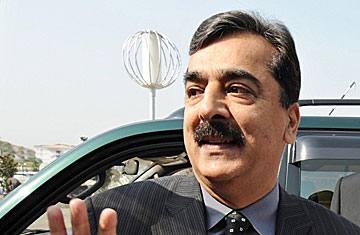
Yousaf Rraza Gilani
A month after winning parliamentary elections, the party of Pakistan's slain former Prime Minister Benazir Bhutto announced Saturday that its candidate for Prime Minister will be Yousaf Raza Gilani, a former parliamentary speaker and close aide to Bhutto, who spent four years in jail on allegations that he abused his authority during Bhutto's second term as premier in the 1990s. Pakistan's new parliament is set to vote on a Prime Minister Monday, with President Pervez Musharraf due to swear in the new premier Tuesday. Gilani's Pakistan People's Party (PPP) will form a government in coalition with the Pakistan Muslim League (Nawaz) (PML-N) of former Prime Minister Nawaz Sharif. Together, the two parties have well over half the seats in parliament and Gilani's election should be a formality.
Gilani will take on his new role at one of Pakistan's most difficult periods. The presidency of Musharraf is deeply unpopular. The PPP's coalition partner, the PML-N, has pushed for the Supreme Court judges dismissed by Musharraf last year to be reinstated — a direct threat to the President's rule. But a showdown with the man U.S. President George Bush calls Washington's key ally in the war on terror may distract the country from its fight against the Islamic extremists who have launched a wave of attacks against military, government and civilian targets over the past year. Last week the incoming government said it would try to sit down and negotiate with the militants, a policy that is causing consternation in Washington. Gilani and the PPP will have to deal with both Musharraf and the rise in militancy even as they grapple with Pakistan's rising inflation and widespread poverty.
Today's announcement was expected to be made by Bilawal Bhutto Zardari, the 19-year-old son of Benazir Bhutto, who was assassinated last December during campaigning for the parliamentary poll. Party officials said Bhutto Zardari was feeling unwell, but some observers speculate that his absence may have been a tack to spare him from answering questions about reported PPP infighting over the premiership. Bhutto Zardari is a student at Oxford, as his mother and politician grandfather were before him, and he became the co-chair of the PPP days after his mother's murder. But the young Bhutto Zardari has played no real role in selecting Gilani. That was done by a small group of party leaders headed by Bhutto Zardari's father Asif Ali Zardari, who is the PPP's other chair and the party's real power.
The elder Zardari could not become Prime Minister himself; he was barred from running for parliament because of outstanding corruption charges. But a Pakistani court recently dismissed the last of those charges, opening the way for Zardari to contest a by-election, join parliament and perhaps become Prime Minister himself down the line. Some PPP insiders say he may prefer to continue as party leader, wielding power from behind the scenes; others believe Gilani's premiership will be short-lived and that Zardari will take over. Much will depend on how the PPP and its coalition partners fare in the coming months as the new government takes on the difficult job of running one of the world's most dangerous countries.
